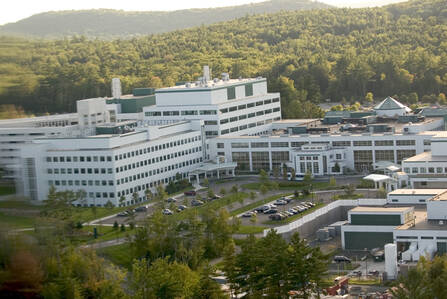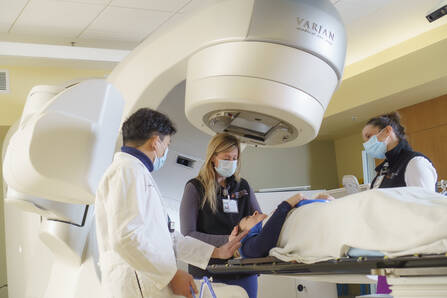What is an NCI-designated Comprehensive Cancer Center?
Created as part of the National Cancer Act of 1971, the National Cancer Institute (NCI) designates centers that meet rigorous standards for clinical services and cancer care. Only 4 percent (72) of cancer centers earn NCI designation, and only 57 achieve the elite status of an NCI-designated comprehensive cancer center.
An NCI-designated comprehensive cancer center uses the highest standards of scientific excellence in prevention, treatment, diagnosis, research and education. Typically, these centers are affiliated with an academic medical school. At Dartmouth, we employ the full power of the health system, the medical school, the engineering school and an exceptional university to advance methods for treating and curing cancer.
Why this matters?
Receiving care at an NCI-designated cancer center has been shown to increase long-term survival rates by up to 25 percent. Patients at these centers receive superior care and enhanced access to life-changing clinical trials, research and cutting-edge treatments.
Learn more about NCI-designation status
NCI Comprehensive Cancer Centers comprise the most robust, innovative laboratory and clinical cancer research programs in the country. This is the research that’s making the biggest difference in cancer prevention, diagnostics and treatment and ultimately in finding a cure.
Steven D. Leach, MD, Director of Dartmouth Cancer Center
Through a competitive grant review process every 5 years, Dartmouth Cancer Center has held this prestigious and competitive designation since the introduction of the title in 1990 and is still the only NCI-designated comprehensive cancer center in northern New England and one of 3 in all of New England. This designation means that our cancer center does it all.
Cancer treatment
We treat all types of cancers using an interdisciplinary team-based approach. Specially trained doctors, nurses, radiologists, pathologists, social workers, nutritionists, physical therapists and more come together to discuss each patient’s case and determine the best, individualized treatment plan for each patient. Together, this team of providers manages all aspects of a patient’s cancer care journey.
Cancer research
Our research enterprise consists of 4 groups in addition to a full portfolio of early and later-stage clinical trials available to patients.
- The Cancer Biology and Therapeutics Research Program studies basic mechanisms of cancer.
- The Cancer Population Science Research Program researches environmental and genetic cancer risk factors, behavioral cancer risk reduction, cancer prevention, and healthcare delivery research.
- Immunology and Cancer Immunotherapy focuses on developing new therapies for cancer that harness the power of the body’s own immune system.
- The Translational Engineering in Cancer Program brings scientific discoveries into clinical practice through imaging, radiobiology, biophysics, and engineering approaches for new cancer diagnostic and treatment tools and strategies.
NCI Comprehensive Cancer Centers are also responsible for educating the public and healthcare professionals and providing outreach to underserved populations. Dartmouth Cancer Center runs an active Global Oncology Program dedicated to bringing evidence-based solutions to the worldwide cancer burden, as well as training programs for scientists and researchers and prevention, education, and outreach efforts for our communities.
Dartmouth Cancer Center’s outstanding basic science research provides the foundation on which future therapies for cancer will be built. Our exceptional translational and clinical research infrastructures allow us to extend the most advanced clinical trials to our patients, and offer the most comprehensive, innovative and compassionate approach to their care.
Steven D. Leach, MD, Director of Dartmouth Cancer Center
Learn more about the NCI Cancer Centers Program.


